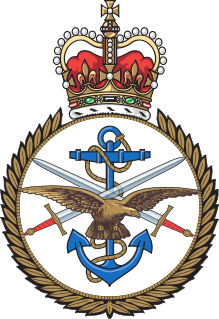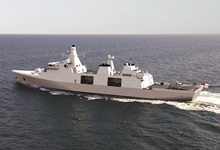Related Research Articles

The Royal Navy (RN) is the United Kingdom's naval warfare force. Although warships were used by English and Scottish kings from the early medieval period, the first major maritime engagements were fought in the Hundred Years' War against the Kingdom of France. The modern Royal Navy traces its origins to the early 16th century; the oldest of the UK's armed services, it is known as the Senior Service.

The British Armed Forces, also known as Her Majesty's Armed Forces, are the military services responsible for the defence of the United Kingdom, its overseas territories and the Crown dependencies. They also promote the UK's wider interests, support international peacekeeping efforts and provide humanitarian aid.
Military doctrine is the expression of how military forces contribute to campaigns, major operations, battles, and engagements.

The Ministry of Defence is the British government department responsible for implementing the defence policy set by Her Majesty's Government, and is the headquarters of the British Armed Forces. It is the UK's ministry of defence.

Defence Intelligence (DI) is an organisation within the United Kingdom intelligence community which focuses on gathering and analysing military intelligence. It differs from the UK's intelligence agencies in that it is an integral part of the Ministry of Defence (MoD) rather than a stand-alone organisation. The organisation employs a mixture of civilian and military staff and is funded within the UK's defence budget. The organisation was formerly known as the Defence Intelligence Staff (DIS), but changed its name in 2009.

Future planning of the Royal Navy's capabilities is set through periodic Defence Reviews carried out by the British Government. The Royal Navy's role in the 2020s, and beyond, is outlined in the 2021 defence white paper, which was published on March 22, 2021. The white paper is one component of the Integrated Review of Security, Defence, Development and Foreign Policy, titled as Global Britain in a Competitive Age which was published on March 16, 2021.
The Strategic Defence Review (SDR) was a British policy document produced in July 1998 by the Labour Government that had gained power a year previously. Then Secretary of State for Defence, George Robertson, set out the initial defence policy of the new government, with a series of key decisions designed to enhance the United Kingdom's armed forces.
The 2003 Defence White Paper, titled Delivering Security in a Changing World, set out the future structure of the British military, and was preceded by the 1998 Strategic Defence Review (SDR) and the 2002 SDR New Chapter, which responded to the immediate challenges to security in the aftermath of the September 11 attacks in 2001. Published under the then Secretary of State for Defence, Geoff Hoon, the report effectively introduced a series of cutbacks to core equipment and manpower and the scaling back of a series of future capital procurement projects. This was justified due to the implementation of a policy termed Network Enabled Capability. The review also outlined a major restructuring and consolidation of British Army Infantry regiments.

The United Kingdom's Strategic Command, previously known as Joint Forces Command (JFC), manages allocated joint capabilities from the three armed services.
The Defence Industrial Strategy (DIS) is a United Kingdom government policy which was published as a white paper on 15 December 2005. The purpose of the DIS is stated to be to ensure that the UK armed forces are provided with the equipment they require, on time, and at best value for money. This is achieved through the maintenance of sovereign capabilities, i.e. the capabilities of UK companies in key defence areas.
The planning for the future of the Royal Air Force involves supporting ongoing British military operations, the introduction of new aircraft types, greater focus on network enabled capability and increasing interoperability with members of NATO.
The National Security Strategy of the United Kingdom sets out the risks that UK faces and how the government of that day will address such risks.
The Strategic Defence and Security Review 2010 was announced by the newly formed Conservative-Liberal Democrat coalition government of the United Kingdom in May 2010, and published on 19 October 2010. The previous major review of UK defence strategy was the Strategic Defence Review, published in 1998, and updated in 2003 by the Delivering Security in a Changing World white paper.
The Norwegian Defence Security Department (NORDSD) is a joint security and counter-intelligence military intelligence service within the Norwegian Armed Forces. Its members are a mix of civilian employees and military personnel. The head of the service holds the military rank Colonel or (naval) captain.

The Lancaster House Treaties of 2010 are two treaties between the United Kingdom and France for defence and security cooperation. They were signed at 10 Downing Street on 2 November 2010 by British prime minister David Cameron and French President Nicolas Sarkozy.
Army 2020, was the name given to the restructuring of the British Army, in light of the 2010 Strategic Defence and Security Review.

Ireland and the North Atlantic Treaty Organization have had a formal relationship since 1999, when Ireland joined as a member of the NATO Partnership for Peace (PfP) programme and signed up to NATO's Euro-Atlantic Partnership Council (EAPC). To date, Ireland has not sought to join as a full NATO member due to its traditional policy of military neutrality.
The National Security Strategy and Strategic Defence and Security Review 2015 was published by the British government during the second Cameron ministry on 23 November 2015 to outline the United Kingdom's defence strategy up to 2025. It identified key threats to the UK and the capabilities it required to address them.

The Type 31 frigate, also formerly known as the Type 31e frigate or General Purpose Frigate (GPFF), is a planned class of frigate for the United Kingdom's Royal Navy intended to enter service in the 2020s alongside the Type 32 frigate, and the more capable Type 26 frigate.
The Integrated Review of Security, Defence, Development and Foreign Policy, often known as the Integrated Review, and titled as Global Britain in a Competitive Age, is a review by the British Government into the foreign, defence, security and international development policies of the United Kingdom. Described by Prime Minister Boris Johnson as "the largest review of its kind since the Cold War", the review was published on 16 March 2021.
References
- ↑ "MOD sets the big questions for Strategic Defence Review". Ministry of Defence (United Kingdom). 3 February 2010. Archived from the original on 6 February 2010. Retrieved 6 February 2010.
- ↑ "UK armed forces 'need coalitions' for future conflicts". BBC News. 3 February 2010. Archived from the original on 6 February 2010. Retrieved 6 February 2010.
- ↑ Jonathan Beale (3 February 2010). "Cash, cutbacks and Britain's place in the world". BBC News. Archived from the original on 6 February 2010. Retrieved 8 February 2010.
- ↑ "Linda Gilroy To Visit French Warship". politics.co.uk. 4 February 2010. Archived from the original on February 13, 2010. Retrieved 8 February 2010.